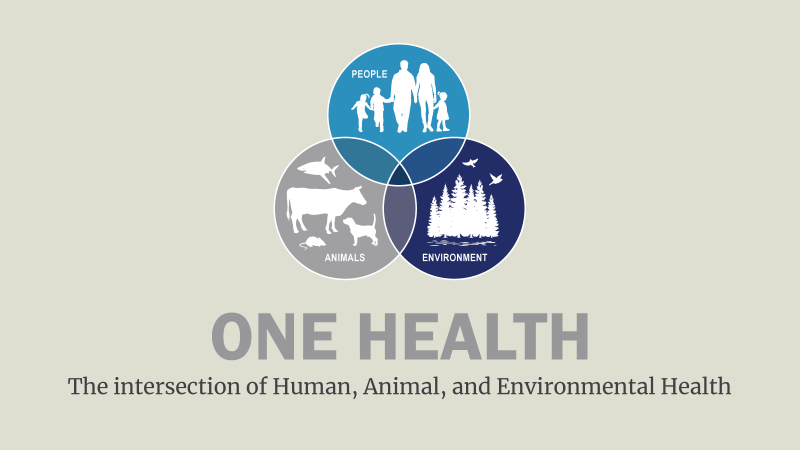Cross-cutting Topics: One Health Initiative
The One Health concept is a worldwide strategy for expanding interdisciplinary collaborations and communications in recognition of the inter-connectedness of human, animal, and environmental health. FDA works at the nexus of three One Health domains: (1) human health, (2) animal health, and (3) environmental health, and relies on collaboration to assist in solving complex health problems. FDA uses the One Health strategy to develop stronger cross-center and -office relationships, exchange educational experiences within the agency and with other Federal agencies, and further public and global health.
The One Health strategy helps FDA analyze and identify solutions to resolve health disparities in clinical trials, research, and treatments of infectious, chronic, and debilitating diseases for humans and animals. This comprehensive perspective on health and environmental problems supports inclusivity of various populations and socio-economic levels. Adopting One Health strategies also encourages FDA to take a more diverse scientific approach, which can enhance FDA’s regulatory decision-making and the relevancy of policy development.
Many global changes and activities have altered interactions among people, animals, and the environment. For example, using the One Health approach:
- FDA studies factors that give rise to zoonotic transmission (diseases that can spread from animals to people) when there are disruptions to human and animal interactions caused by changes in ecology, thus affecting public health challenges and concerns (e.g., avian influenza, Ebola virus disease, tick-borne diseases, West Nile virus, Zika virus, and coronavirus).
- FDA conducts studies to look at ecological relationships on farms to reduce foodborne contamination and illnesses and protect the global food supply. Here, FDA surveilles the geographic variation of foodborne pathogens in water for agricultural use to better understand the environment’s relationship to foodborne contamination and public health.
- FDA submits foodborne pathogen genomes identified in their foodborne outbreak studies to the National Center for Biotechnology Information Pathogen Detection web portal for surveillance and source tracking of pathogens. By sharing whole genome sequencing (WGS) data in a public and global database, all stakeholders can quickly see whether there is a One Health connection to their pathogens.
In addition, a central theme of the National Antimicrobial Resistance Monitoring System for Enteric Bacteria (NARMS) 2021-2025 Strategic Plan is One Health. Enteric Bacteria (NARMS) 2021-2025 Strategic Plan is One Health. FDA is an active member in NARMS, a multi-agency public health surveillance system conducting surveillance of antimicrobial use and WGS resistance data to better track resistance trends and outbreaks in foodborne and other enteric (intestinal) bacteria. In accordance with the principles of One Health, NARMS is expanding its testing to include environmental water samples through a collaboration with the U.S. Environmental Protection Agency and animal pathogens through collaborations with FDA’s Veterinary Laboratory Investigation and Response Network and U.S. Department of Agriculture Animal and Plant Health Inspection Service. Learn more about the One Health Initiative at FDA.
FDA One Health Mission
FDA collaborates with stakeholders across disciplines and sectors to promote the health of humans, animals, and the environment using science, technology, and innovation.
FDA One Health Vision
Optimal public health outcomes for humans and animals in their shared environment.
| Women’s Health | Maternal Health | Pediatric Health |
| Oncology | Rare Diseases | One Health Initiative |
Research Capabilities, Tools, and Resources
| Research Management and Collaborations | Technology Transfer and Public-Private Partnerships | Physical Standards and Reference Materials | Intramural Grant Programs | Extramural Funding Mechanisms |
Scientific Education, Training, and Communication
| Fellowship and Training Opportunities | Professional Development and Continuing Education | Communication and External Meetings |
Infrastructure
| Facilities and Shared Resources | Safety and Compliance |
| Office of the Chief Scientist | Office of Regulatory Science and Innovation | Contact Us: FARS@fda.hhs.gov |

